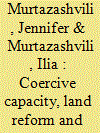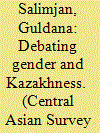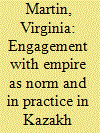|
|
|
Sort Order |
|
|
|
Items / Page
|
|
|
|
|
|
|
| Srl | Item |
| 1 |
ID:
152308


|
|
|
|
|
| Summary/Abstract |
This article compares four historical periods in Afghanistan to better understand whether land reform in the post-2001 context will improve prospects for political order. Its central finding is that political order can be established without land reform provided that the state is able to establish and maintain coercive capacity. However, the cost of establishing political order mainly through coercion is very low levels of economic development. We also find that when land reform was implemented in periods of weak or declining coercive capacity, political disorder resulted from grievances unrelated to land issues. In addition, land reforms implemented in the context of highly centralized political institutions increased property insecurity. This suggests the importance of investing in coercive capacity alongside land reform in the current context but also that establishing inclusive political institutions prior to land reform will increase its chances of success.
|
|
|
|
|
|
|
|
|
|
|
|
|
|
|
|
| 2 |
ID:
152311


|
|
|
|
|
| Summary/Abstract |
Aytis is a central component of Kazakh oral literature. It is a duelling performance of improvised oral poetry between two aqins (poets, or bards) accompanying themselves on the dombra, a two-stringed plucked instrument. This article analyses contending issues in a transnational aytis between Chinese and Kazakhstani aqins, and explores how gender plays into the complex interplay of transnational identity politics, nationalism, performer positionality, and the preservation of intangible cultural heritage. This article argues that, though minority actors are subject to state-patronized national projects and the gender paradigms those projects entail, they can also obtain empowerment from performing tradition as a way to legitimize their status as culture producers and flexible citizens. Situated as the guardians of a constructed gender balance in society, women performers of oral tradition occasionally find themselves with opportunities to transgress the boundaries of their national and gender norms.
|
|
|
|
|
|
|
|
|
|
|
|
|
|
|
|
| 3 |
ID:
152306


|
|
|
|
|
| Summary/Abstract |
This article offers an analysis of the Kazakh nomadic political culture of the 1820s–30s with focus on two issues: (1) service and loyalty as elements of Kazakh engagement with the Russian Empire; and (2) the place in local political practice of the regional administrative offices (diwans) created for Middle Horde Kazakh nomads in 1822. While Russia’s goal was ‘bureaucratization’ and creation of ‘order’ in the steppe, in part through directing nomads to engage with the diwan and its elected Kazakh officials, Kazakh political actors variously embraced and rejected formal structures, and continued to define relevant norms and practices of governance. The analysis challenges both statist and nationalist narratives of nineteenth-century Kazakh steppe history by acknowledging the complexities of the Kazakh nomadic experience of empire-building. The ultimate purpose is to suggest new approaches for interpreting historical change throughout the nineteenth century and into the twentieth.
|
|
|
|
|
|
|
|
|
|
|
|
|
|
|
|
| 4 |
ID:
152310


|
|
|
|
|
| Summary/Abstract |
This article attempts to describe the deleterious impact of higher educational changes affecting female faculty members working in Tajik universities in the post-Soviet era. Over the past two decades, the social and economic position women gained during Soviet times has significantly eroded, bringing enormous challenges to education and higher education access, completion and staffing. The demographic and cultural marginalization of women here has negatively impacted university teaching opportunities and the status of women faculty members. Ethnographic interviews – along with relevant secondary data – reveal that despite various official gender-equity policies announced by the state, female participation issues remain prominent in the university. Our interviewees also report continued difficulty entering higher faculty ranks and leadership positions in university. However, significant numbers of women are still to be found there, and they report a workable compromise between being professional educators and trying to navigate a local culture that is becoming more ‘traditional’.
|
|
|
|
|
|
|
|
|
|
|
|
|
|
|
|
| 5 |
ID:
152309


|
|
|
|
|
| Summary/Abstract |
A recent child-work study by the International Labour Organization reports that 27% of children in Tajikistan ages 5–17 worked in 2013. Although children worked in agriculture or performed household chores in Soviet Tajikistan, child work for pay is a relatively new phenomenon in modern Tajikistan. This study examines the pathways to child work and the families’ perceptions of child work experiences. Some of the main findings of this study are the themes connected to normalization and acceptance of child work in Tajikistan. These are explained by expectations placed on children at the social, family and personal levels that are in turn affected by macroeconomic forces that are by-products of the transitional economy. The study also explores differences in expectations by gender, age and area of residence.
|
|
|
|
|
|
|
|
|
|
|
|
|
|
|
|
| 6 |
ID:
152307


|
|
|
|
|
| Summary/Abstract |
In some Central Asian oasis towns, the patron saints of craftsmen, known as pirs, have continued to be venerated, despite the repression of Islam and changes to the industrial structure during the Soviet Era. This paper analyses the social function and individual significance of pir veneration in the modern era, using ethnographic observations and interviews conducted in a ceramics town in Uzbekistan. Today, many old customs practised in pottery studios have become mere formalities, and the controlling role of the pirs over ceramist groups is declining. However, this is not necessarily indicative of an immediate decline in the pirs’ power. Some ceramists believe their highly skilled masters to be quasi-pirs and that the pir provides them with desirable goals, in addition to an ideal form to which to aspire.
|
|
|
|
|
|
|
|
|
|
|
|
|
|
|
|
|
|
|
|
|